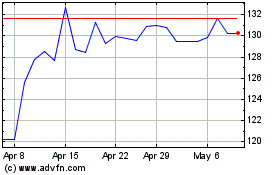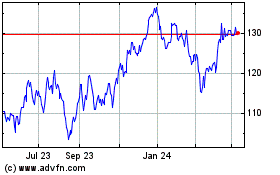Lower commodity prices pressured Asian resources shares this
week, while a weaker yen helped put Japanese shares on track for
their sixth week of gains.
The Nikkei Stock Average is on track to finish up 0.5% for the
week, and approaching the 20000 on Friday, a level it last closed
above on Aug. 20. It was last down 0.3% at 19891.66.
A weakening Korean won has led to standout weekly returns for
South Korea's Kospi, too, which is on track to post a 2.1% gain. On
Friday, the Kospi rose 0.1%.
Meanwhile, the materials sector pressured Hong Kong's Hang Seng
Index and Australia's S&P/ASX 200, which fell 1.2% and 3.7%,
respectively, this week.
Australian shares are up 0.3% on Friday. The Shanghai Composite
Index fell 0.5% and Hong Kong's Hang Seng Index fell 0.3%.
Rising expectations the Federal Reserve will raise interest
rates at its December meeting has pushed the dollar higher since
mid-October. That has pressured Asian currencies and commodities,
which become more expensive for other currency holders as the
dollar strengthens.
The Wall Street Journal Dollar Index, which gauges the U.S.
currency against a basket of 16 currencies, is hovering around its
highest level in more than a decade.
Asia's weaker currencies have been a boon to some of its stock
markets, particularly for exporters that repatriate profits from
abroad.
In Japan, the gains also reflect excessive optimism about how
aggressive the European Central Bank and Bank of Japan will be in
December, said Ilya Feygin, managing director at WallachBeth
Capital LLC.
The European Central Bank, which meets Dec. 3, has signaled that
it stands ready to expand its bond purchase program to combat weak
inflation. In Japan, investors are hopeful the central bank will
extend stimulus, after minutes show officials are open to further
action if inflation targets slip out of reach.
Meanwhile, "Fed rhetoric has signaled a slow pace of
tightening," even if the central bank raises interest rates, said
Mr. Feygin. "The Asian markets like that."
On Friday, data showed that consumer prices in Japan fell
slightly for the third month in a row in October. The figures
indicated that sustained inflation remains elusive despite the
central bank's efforts to spark price growth. Some economists have
forecast that flatlining inflation may force the bank and some of
its peers to ease again.
The Japanese yen was last at ¥ 122.59 to one U.S. dollar,
roughly flat from late Thursday in Asia. The currency has weakened
significantly since mid-October, when it reached as strong as ¥
118.04 to one U.S. dollar.
Earlier this week, metals including copper and nickel, which are
priced in dollars, dropped to multiyear lows. Miners BHP Billiton
Ltd. and Rio Tinto Ltd. are on track to lose 6.8% and 3.5%,
respectively, this week. On Friday, the stocks rose 1% and
0.9%.
Metals rebounded Thursday after reports that China will start
buying industrial metals to stock up its strategic reserves.
Analysts highlighted several media reports saying that the Chinese
government may buy large quantities of nickel, zinc and aluminum
for its own reserves and to alleviate a domestic oversupply.
Copper prices hit an eight-day high in London on Thursday, while
nickel pulled back from 12-and-a-half-year low to trade back above
$9,000 a ton on the news.
China is the biggest consumer of base metals, accounting for
about 48% of global copper demand, 50% of nickel demand and 54% of
aluminum demand in the first six months of this year, according to
World Bureau of Metal Statistics data.
In China, the Shanghai Composite Index is headed to finish the
week up 0.1%. Its gains come even as authorities in Beijing
escalate their crackdown in the financial sector, following the
summer's stock-market rout.
On Thursday, the country's largest stock broker, Citic
Securities Co., said it would cooperate with China's stock
regulator in an investigation of the firm for suspected violation
of securities rules. Guosen Securities, China's third-largest
broker by assets, is also under investigation for suspected
violations, according to the company's filing to the Shanghai Stock
Exchange.
Shares of Citic in Hong Kong and Guosen in Shenzhen fell more
than 4.5% on Friday. They are down 1.8% and 7.7%, respectively,
this week.
Markets in the U.S. were closed Thursday for the Thanksgiving
holiday.
Brent crude was last up 0.2% at $45.53 a barrel. U.S. oil prices
fell 0.4% on Thursday amid signs of robust U.S. production despite
data showing a lower-than-expected increase in U.S. oil inventories
and a decline in the number of working oil-rigs in the country.
Gold prices were flat at $1,070.80 a troy ounce.
Write to Chao Deng at Chao.Deng@wsj.com
Subscribe to WSJ: http://online.wsj.com?mod=djnwires
(END) Dow Jones Newswires
November 26, 2015 22:05 ET (03:05 GMT)
Copyright (c) 2015 Dow Jones & Company, Inc.
Rio Tinto (ASX:RIO)
Historical Stock Chart
From Mar 2024 to Apr 2024

Rio Tinto (ASX:RIO)
Historical Stock Chart
From Apr 2023 to Apr 2024
